Like a 'Wide and Mighty River'
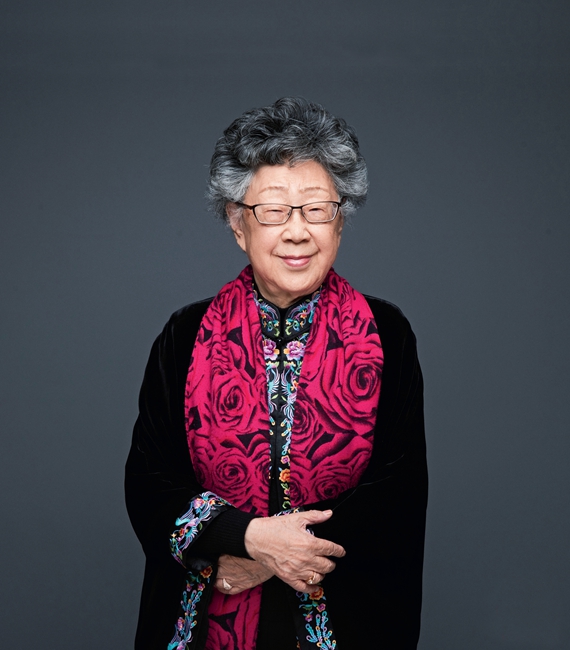
Huang Huilin, in her 90s, is a Party (Communist Party of China) member who has lived her life to the fullest. During the 1950s, she joined the Chinese People's Volunteers entering the Democratic People's Republic of Korea (DPRK) to fight in the War to Resist US Aggression and Aid Korea. After she returned from the war and received military awards, she decided to dedicate her life to education.
Huang currently is a senior professor with Beijing Normal University (BNU) and dean of the Academy for International Communication of Chinese Culture (AICCC).
Over the past six decades, Huang helped establish a theater, film and television studies program; in so doing, she became the first supervisor of a Ph.D. program in filmology in China.
She also established BNU students' theater society, in the 1980s; in 1993, she helped launch Beijing University Student Film Festival. Since then, she has helped implement a series of cultural-communication programs, to promote the impressions of China — through foreigners' eyes.
As she continues to live her life like a "wide and mighty river," Huang continues to write her own legend.
Age isn't slowing Huang. In March 2024, she was the eldest of 10 women named March 8th Red-Banner Pacesetters. She was also named one of the year's "most beautiful women strivers."
Says Huang: "Looking back, to the past, education has been an indispensable part of my life. Looking forward, to the future, I will continue walking on a path full of exploration, cordial care, and dedication."
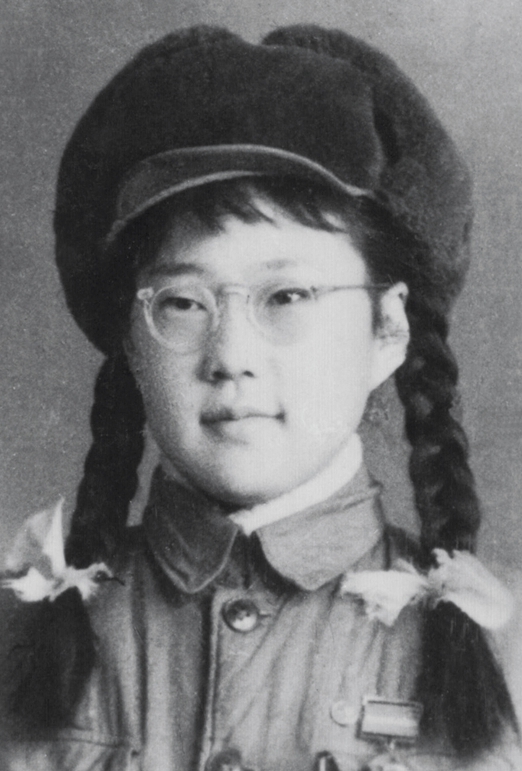 |
| A portrait of Huang Huilin, taken in 1952 in the Democratic People's Republic of Korea |
Blooming Bravely on Battlefield
Huang was born in 1934 in Tianjin, in North China. She grew up in East China's Shanghai, but she entered school in Suzhou (currently a city in East China's Jiangsu Province). She spent much of her youth moving between Tianjin, Beiping (now Beijing), Shanghai and Suzhou. She moved to Beijing with her father in 1950, and she enrolled in the high school affiliated with BNU.
After the War to Resist US Aggression and Aid Korea broke out, Huang, then a young student, applied to join the Chinese People's Volunteers entering the Democratic People's Republic of Korea (DPRK) to fight in the war.
Before she headed for battle, Huang changed the Chinese characters of her given name, Huilin, from " 慧麟 " to " 会林 " — as the latter characters had the same pronunciation but were much easier to write. She recalls how she agreed — without hesitation — with an instructor's suggestion she change the characters. "My fellow comrades would be able to remember and write my name easily. To some extent, it saved time when communicating on the battlefield. That was crucial!"
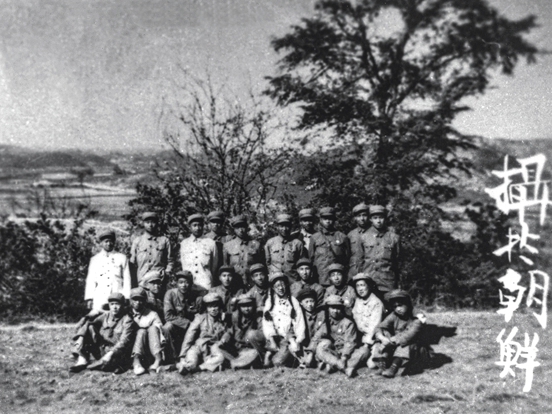 |
| A group photo of Huang Huilin and her comrades after the Battle of the Ch'ongch'on River. Huang was among the 100 soldiers named "meritorious" soldiers of the Chinese People's Volunteers |
Huang was one of the soldiers fortunate enough to survive the war. She will never forget how she and her comrades transferred cannonballs to the battlefield during the Battle of the Ch'ongch'on River. More than 100 soldiers from her regiment died in that battle.
"Participation in the war has left me with a strong sense of mission, that I must make efforts, throughout my life, to help foster the vigorous development of my country," Huang says.
In 1954, after she returned from the war, Huang resumed her studies at a school affiliated with BNU. She received a title, as a "meritorious" soldier of the Chinese People's Volunteers, and also a silver military medal from DPRK.
In 1955, after she graduated from high school, Huang received a recommendation to enroll in BNU's Chinese literature department. In 1958, after she graduated from that program, she was offered a position teaching modern Chinese literature. Huang has since spent 66 years teaching at the university.
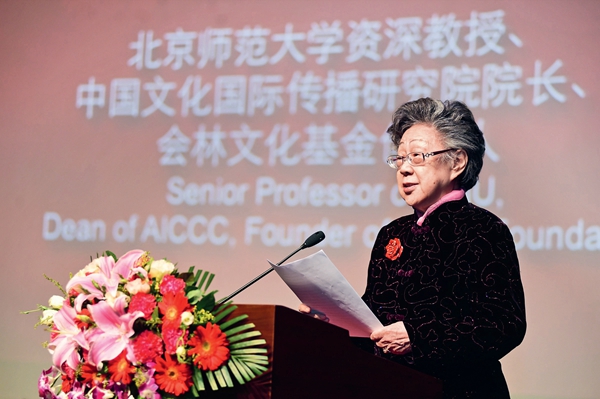 |
| Huang Huilin makes a speech during the ceremony to present the inaugural Huilin Prize (photo taken in 2015) |
New Start
While Huang was a fulltime teacher, her courses were very popular. In the 1980s, she and her husband, Shao Wu, founded BNU students' theater society, which has been the source of tremendous, wonderful performances.
In 1992, as BNU was planning to establish the first film and television studies program in a comprehensive university in China, Huang was tasked by BNU's president to become director of the arts department, and to help establish the program. Huang was 58 then, and just two years away from retirement. However, she accepted the mission.
Under the guidance of Huang, the experienced and diligent professor, BNU in 1993 established a master's program focusing on the arts and techniques adopted in film and television projects. In 1994, the first class of undergraduate students majoring in film and television began their program. In 1995, BNU established a Ph.D. program in filmology, making BNU the first university in China to establish such a program.
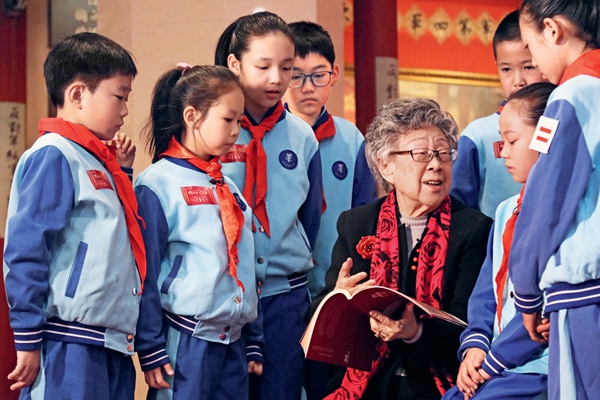 |
| Huang Huilin, with primary school students |
Promoting True China to World
"The 'language' conveyed by film and television works can be international. But the 'grammar' of the film and television works of a nation ought to have its own traits," Huang has been quoted as saying.
Holding onto that belief, Huang established the Academy for International Communication of Chinese Culture (AICCC), under BNU, in 2010. She proposed a concept named the "Third Pole Culture." Huang believes there are three major forces among the diverse cultures of the world.
She suggests if European culture and American culture are considered "two poles," given the influences of the two cultures upon the world, then Chinese culture, endowed with rich traditional resources, which have extended thousands of years, can be considered the "Third Pole Culture."
Says Huang: "We should have confidence in our culture, and we need to promote the essence of our culture, by telling the world what the true China is all about."
In 2011, Huang established a cultural communication program specifically for young film directors from other countries. By 2023, AICCC had organized 1,009 young directors from 102 countries, including the United States, Canada, the United Kingdom, France and Italy, to visit China and produce a combined 985 short films. Those films have earned nearly 190 awards globally.
Huang has visited many areas of China, including bustling metropolises like Beijing, Shanghai and Guangzhou, and simple and natural rural areas in Shaanxi and Gansu provinces and Ningxia Hui Autonomous Region (in Northwest China), Heilongjiang, Jilin and Liaoning provinces (in Northeast China), and Yunnan, Guizhou and Sichuan provinces (in Southwest China).
She has collected outstanding stories about folk arts and culture, which she has taught to students from both home and abroad, showing the charms of the diverse, rich and colorful Chinese culture.
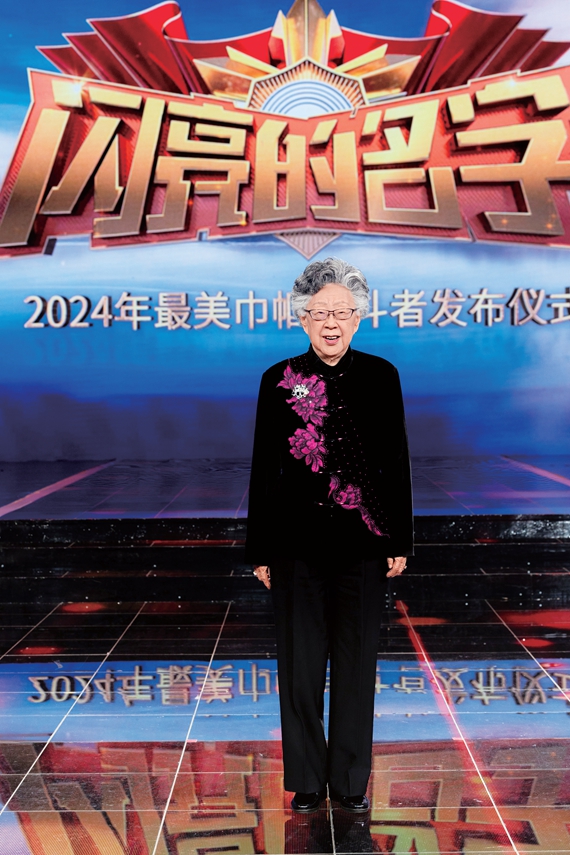 |
| Huang Huilin is recognized as one of the "most beautiful women strivers" in 2024 |
Be a Good Person First
Ten years ago, Huang proposed making the course on Chinese culture and traditional aesthetics compulsory for Ph.D. students in BNU's arts programs. She also clarified several requirements, for both students and teachers.
For example, students were required to learn the original works related to various topics involving Chinese culture and traditional aesthetics. Also, each class included a question-and-answer session, each teacher provided a score and his/ her comments on students' assignments. Further, the students had to write their assignments by hand, and a supervisor was assigned to check and record students' works and the teachers' comments.
One student provided the following feedback: "I have learned from this course the approach of finding truth. I have improved my confidence in, and my sense of responsibility about, conducting academic research in literature and arts." Huang expects all of her students to "surpass" her achievements. Many of her students have graduated to become talents devoted to education at BNU, or other universities in China.
Li Zhenlin, a professor with Shanghai Theatre Academy, was once one of Huang's Ph.D. students. Li remembers the first time he and the other students met Huang. "It was an evening. Professor Huang told us we must first learn to be a good person, before we could become good workers in the field of the arts," Li recalls.
Huang celebrated her 90th birthday on February 21, 2024. Renowned scholar Yu Dan, a BNU professor and one of Huang's former Ph.D. students, paid tribute to her mentor. "I respect Professor Huang, from deep down in my heart. For many people who celebrate their 90th birthday, they may recall their life paths, based on the length of their age. But to me, the life of Professor Huang is more like a 'wide and mighty river,' which embodies a broad and profound spirit."
Photos from Academy for International Communication of Chinese Culture, Beijing Normal University
Source: China Education Daily
(Women of China English Monthly July 2024)
Editor: Wang Shasha
Please understand that womenofchina.cn,a non-profit, information-communication website, cannot reach every writer before using articles and images. For copyright issues, please contact us by emailing: website@womenofchina.cn. The articles published and opinions expressed on this website represent the opinions of writers and are not necessarily shared by womenofchina.cn.








.jpg)

 WeChat
WeChat Weibo
Weibo 京公网安备 11010102004314号
京公网安备 11010102004314号